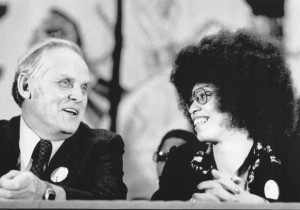Gus Hall (October 8, 1910 – October 13, 2000) was a leader and Chairman of the Communist Party USA (CPUSA) and its four-time U.S. presidential candidate. During the Great Repression of the 1940s and 50s, Hall was indicted under the Smith Act by the bourgeois regime in Washington D.C. and was sentenced to eight years in prison. After his release, Hall led the CPUSA for over 40 years, often taking an orthodox Marxist-Leninist stance which intensely annoyed most of his comrades.
The concept of political independence varies when applied to individuals, groups, or states. With individuals, a candidate is independent when he or she is not affiliated with any political party. Again, an independent voter is a voter who does not align him or herself with a political party. However, proletarian parties commonly called their candidates “independent” as long as their candidate isn’t affiliated with a bourgeois party or another proletarian party. In the USA, when “independent” is applied to a group, it seems to mean a group that is separate from the two old bourgeois parties [the DP and GOP], even if the group is somehow affiliated or allied with other third parties.
“In every case the Party should focus on offices it aims to win — if not [this year] then over the course of the next few elections,” Gus Hall wrote in “Unity! The Only Way.”
Hall applied this rule in 1988 to CPUSA, but it applies today to a number of political organizations.
Under the rule which he formulates, Hall must have concluded that his party should not have focused on any of his four campaigns for president of the USA.
What does “in every case” mean?
It means in no case should a left party focus on offices it doesn’t aim to win. It also means in no case should a party focus on offices it doesn’t aim to win either now or over the course of the next few elections.
“Such a proposition requires a basic change in how we conduct our campaigns,” Hall wrote.
Why is this change in the conduct of campaigns basic?
Before the aiming-to-win strategy, campaigns aimed to lose or aimed merely to run. If so, then an aiming-to-win strategy is indeed a basic change.
Does the rule about a party not focusing on campaigns where the candidate can’t win, either now or over the course of the next few elections, apply also to Communists?
Hall’s answer to the question of whether the rule applies to Communists is tough to interpret, even though the rule applies to every case and a Communist candidate is a case.
Here’s Hall’s answer:
“The fact is we have now overcome the barrier that ‘Communists cannot be elected.’ Even though our candidates’ votes and constituencies took a big leap in recent elections, most of us still do not think in terms of Communists actually getting elected. This is the necessary next stage in the development of Communist campaigns,” Hall wrote.
Hall seems to be saying that Communists have recently won a number of elections, running as candidates of the two old bourgeois parties. These wins prove that the alleged barrier “Communists cannot be elected” is false. But most Communists still don’t see these wins as Communists actually getting elected; they see these wins as candidates of bourgeois parties actually getting elected. In other words, most Communists want and expect Communists to run as Communists, not as candidates of bourgeois parties.
Under the rule, as formulated above by Hall, a Communist running openly as a Communist also has to win because winning is the key thing, not merely running or losing. Further, a winning Communist, running openly as a Communist, satisfies the rule. A winning Communist, running as a candidate of a bourgeois party, also satisfies the rule.
But a losing Communist, no matter how he/she runs, is just a loser.
Lenin dealt with phony participation in political struggle in his “Leftwing Communism” and his “What Is to Be Done.” Obviously, aiming to lose is phony participation. Lenin called it a baby disease, an infantile disorder, pseudo anarchism, quasi-anarchism, and semi-anarchism.
WHAT MOSTLY DEFEATS OPEN COMMUNISTÂ CANDIDATES TODAY?
Hall rejects the explanation that the label of Communist is the chief cause of a loss when the candidate exposes his or her Communist affiliations.
Hall points to the political incompetence and bungling of Communists as the main cause of the losses when Communists campaign openly as Reds.
“Generally, we are good on program, but come up very short on the mass organization side of running campaigns … To reach a new, higher stage we must raise the level of professionalism in the use of media, literature, posters, and in fund raising. We must master campaign organization techniques to identify, mold and hold a Communist electoral constituency.
We must establish an apparatus to get out the vote on election day. We must focus more on door-to-door canvassing and involving non-Party volunteers,” Hall wrote, explaining why Communists who run as Communists lose.
Hall wanted Communists to master all of the specialties of the art of campaigning, even though he didn’t mention all of the specialties in the preceding paragraph.
Hall understood that amateurs are unlikely to prevail over political professionals.
Hall’s proposals were unwelcomed but quietly tolerated in 1988 when he presented them. They haven’t been acted on at all since their 1988 presentation.
CONCLUSION
Today, revolutionaries must aim to win, not the foolishness of much of the US Left of aiming to lose or aiming merely to run.
Revolutionaries can win either running as revolutionaries or running as supporters of political tendencies other than revolutionary.
The label of revolutionary pinned on a candidate is usually not the principal cause of a loss at the polls
The principal cause is that the advanced elements of the electoral base in the USA are untrained and misdirected.
Most of the US Left are incapable of doing anything.
Here is a video of Gus Hall













